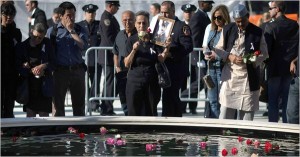9/11 Memoirs
 The ninth anniversary of Sept. 11 passed in New York this weekend with a focus on the two fracases of the day: the “Ground Zero mosque” and the would-be Koran burners and their emulators.
The ninth anniversary of Sept. 11 passed in New York this weekend with a focus on the two fracases of the day: the “Ground Zero mosque” and the would-be Koran burners and their emulators.
For the decade between the fall of the Berlin Wall and the fall of the Twin Towers, many Americans turned away from the rest of the world, a regretful sort of superpower powernap. Talking about Sept. 11 is shorthand for talking about how America should exercise its power in the wider world, how to measure blowback, how to balance soft and hard power, how to curb extremism at its roots while also pruning its branches.
Anne and Manny Fernandez wrote a piece yesterday that catalogues what 9/11 looks like today, rather than trying in overwrought prose to figure out what it means. They focus on “an unmistakable sense that a once-unifying day was now replete with division” – although one could argue that from the first decisions that followed the Sept. 11 attacks American political life grew more divided than ever.
In a similar vein, I reviewed Scott Malcomson’s memoir in the Times’ Sunday Book Review section. Reading his recollection of 9/11 and the years that followed forced me for the first time in ages to recall their intensity and the sense of a bottom falling out.
The morning of Sept. 11, 2001, found me on my stoop in Boston’s South End, waiting for a ride to work. One minute I was enjoying the sunshine, worrying about the logistics of moving house. Then the first plane struck the north tower of the World Trade Center and my entire frame of reference lurched. What I don’t quite remember is how that painful, personal moment connected to America’s national experience in the aftermath of the attacks — and to what many saw as the erosion of civil liberties, unnecessary wars and the willingness to scorn allies and international institutions.
It is this link that concerns Scott L. Malcomson in “Generation’s End: A Personal Memoir of American Power After 9/11.” How, Malcomson inquires, did the world’s sole superpower surrender its better judgment and squander so much good will? Read the rest.
Normalcy, perhaps, is a feeling that only prevails in historical retrospect.

